My News and Reviews
Last week was the Yumi Tamura Manga Moveable Feast, hosted at Tokyo Jupiter. For my contribution to the Feast, I reviewed Tamura’s Chicago, Volume 1: The Book of Self and Chicago, Volume 2: The Book of Justice. Chicago was the first of Tamura’s manga to be officially released in English. The series had great potential, so it was shame that Tamura prematurely ended it after only two volumes. Anna of Tokyo Jupiter also took a look at Beauty and Grit in Tamura’s Chicago, with a particular focus on the use of music in the series.
While paging through the August 2013 issue of Otaku USA I came across a review for Manga: Introduction, Challenges, and Best Practices. I don’t know how I missed the fact that this book was being published; there currently seems to be very little information about it available. It’s being edited by Manga Bookshelf‘s Melinda Beasi for the Comic Book Legal Defense Fund. Contributing authors include Katherine Dacey, Shaenon Garrity, Sean Gaffney, Ed Chavez, Erica Friedman, and Robin Brenner. The book is being funded by a gift to CBLDF from The Gaiman Foundation. I might have just heard about Manga: Introduction, Challenges, and Best Practices, but I’m already very excited for its release.
I recently came across two manga review projects while wandering around on the Internet. The anime blog The Cart Driver has begun a series of Manga Driver posts focusing on, but not limited to, great manga series that haven’t yet been adapted into anime. The queer literature blog I’m Here. I’m Queer. What the Hell Do I Read? has a new intern exploring LGTBQ Teen Manga. Aaron’s list of manga to review includes boys’ love and yuri as well as manga from other genres. (The reviews can be found by browsing the blog’s manga tag.)
I mentioned a few months ago that Vertical’s contract for Keiko Takemiya manga will soon come to an end, meaning that her two series To Terra… and Andromeda Stories will sadly be going out of print. (Additionally, any remaining stock that Vertical has after the cutoff dates will be destroyed.) Right Stuf has a little more information and is currently offering the manga at 40% off. To Terra… in particular is a fantastic series. If you haven’t already read Takemiya’s manga, this would be a good time to pick them up for a great price before they’re gone for good.
Finally, the manga blog Manga Weekend is hosting a Manga Olympics for Bloggers (MOB). Unfortunately, I won’t be able to participate due to my personal and work schedules. I’ll be doing a lot of traveling in June; it’ll be tough enough just to keep Experiments in Manga’s posts on schedule. I do plan on keeping my eye MOB, though, and hope to discover some new manga blogs in the process.
Quick Takes
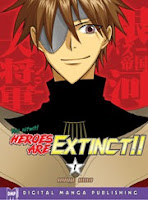 Heroes Are Extinct!!, Volumes 1-3 by Ryoji Hido. I was taken completely by surprise by how entertaining and funny Heroes Are Extinct!! was. Sentai fans in particular will appreciate the series, but others should enjoy it, too. Heroes Are Extinct!! begins as a fairly standard parody but as it progresses Hido incorporates inter-galactic politics and court intrigue as well. Grand Galactic General Cassiel of the Bazue Empire has been charged with conquering Earth, but is disappointed by the lack of heroes. (He may have watched a little too much Earth television as a child.) With no suitable foe present, he begins training the Earth Force Terra Rangers to make his invasion a little more interesting.
Heroes Are Extinct!!, Volumes 1-3 by Ryoji Hido. I was taken completely by surprise by how entertaining and funny Heroes Are Extinct!! was. Sentai fans in particular will appreciate the series, but others should enjoy it, too. Heroes Are Extinct!! begins as a fairly standard parody but as it progresses Hido incorporates inter-galactic politics and court intrigue as well. Grand Galactic General Cassiel of the Bazue Empire has been charged with conquering Earth, but is disappointed by the lack of heroes. (He may have watched a little too much Earth television as a child.) With no suitable foe present, he begins training the Earth Force Terra Rangers to make his invasion a little more interesting.
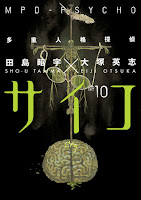 MPD-Psycho, Volume 10 written by Eiji Otsuka and illustrated by Shou Tajima. At the end of 2011 the tenth volume of MPD-Psycho was released by Dark Horse after a two year hiatus. Since then there has been no word if any later volumes will be published. There were some pretty big plot reveals in volume ten, so I sincerely hope that more of the series will be seen in English. The manga isn’t without its problems, but I do find it engaging overall. MPD-Psycho is a graphic, violent, and dark series with an increasingly strange and convoluted plot. Clones, bizarre murders, cults, eugenics, and secret organizations all play important roles even when it’s not immediately clear what those roles are. Tajima’s creepy art style suits the disconcerting story nicely.
MPD-Psycho, Volume 10 written by Eiji Otsuka and illustrated by Shou Tajima. At the end of 2011 the tenth volume of MPD-Psycho was released by Dark Horse after a two year hiatus. Since then there has been no word if any later volumes will be published. There were some pretty big plot reveals in volume ten, so I sincerely hope that more of the series will be seen in English. The manga isn’t without its problems, but I do find it engaging overall. MPD-Psycho is a graphic, violent, and dark series with an increasingly strange and convoluted plot. Clones, bizarre murders, cults, eugenics, and secret organizations all play important roles even when it’s not immediately clear what those roles are. Tajima’s creepy art style suits the disconcerting story nicely.
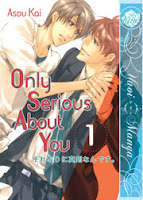 Only Serious About You, Volumes 1-2 by Kai Asou. Although Only Serious About You is a boys’ love series, it’s just as much about Nao trying to raise his young daughter Chizu as a single parent as it is about his developing relationship with Yoshi, an openly gay man who freqents the restaurant where Nao works. The initial circumstances surrounding the two men getting together seemed a little forced to me. (Coming down with a fever seems to be a really big deal in Japan.) However, their bond develops very realistically from there. Only Serious About You is a charming and sweet manga. With its emphasis on family and cooking, it’s also one of the most domestic boys’ love stories that I’ve read.
Only Serious About You, Volumes 1-2 by Kai Asou. Although Only Serious About You is a boys’ love series, it’s just as much about Nao trying to raise his young daughter Chizu as a single parent as it is about his developing relationship with Yoshi, an openly gay man who freqents the restaurant where Nao works. The initial circumstances surrounding the two men getting together seemed a little forced to me. (Coming down with a fever seems to be a really big deal in Japan.) However, their bond develops very realistically from there. Only Serious About You is a charming and sweet manga. With its emphasis on family and cooking, it’s also one of the most domestic boys’ love stories that I’ve read.
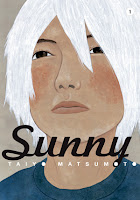 Sunny, Volume 1 by Taiyo Matsumoto. I have become rather fond of Matsumoto’s work and so was excited when Viz announced it would be publishing his most recent manga series Sunny, and in a beautiful hardcover edition no less. The manga follows a group of kids living in a children’s home who either don’t have families or have been separated from them for one reason or another. The narrative isn’t straightforward; instead, Sunny is more a collection of impressions. Many of the vignettes are rather melancholic—none of the kids’ situations are anywhere close to being ideal. But there are moments of cheerfulness and genuine caring as well. Although some might find it ugly, I really enjoy Matsumoto’s artwork. His color pages in particular are lovely.
Sunny, Volume 1 by Taiyo Matsumoto. I have become rather fond of Matsumoto’s work and so was excited when Viz announced it would be publishing his most recent manga series Sunny, and in a beautiful hardcover edition no less. The manga follows a group of kids living in a children’s home who either don’t have families or have been separated from them for one reason or another. The narrative isn’t straightforward; instead, Sunny is more a collection of impressions. Many of the vignettes are rather melancholic—none of the kids’ situations are anywhere close to being ideal. But there are moments of cheerfulness and genuine caring as well. Although some might find it ugly, I really enjoy Matsumoto’s artwork. His color pages in particular are lovely.
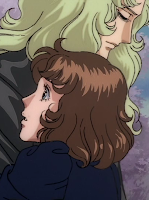 Dear Brother, Episodes 1-20 directed by Osamu Dezaki. Dear Brother is a thirty-nine episode anime adaptation from the early 1990s based on Riyoko Ikeda’s classic yuri manga. Nanako Misonoo is a first year at Seiran Academy, an elite all-girls school. There she is caught up in the drama surrounding three of the most popular girls in the school. As the series progresses the relationships between the characters are revealed to be incredibly complicated. They can also be very tragic, angst-ridden, and twisted. At times the Dear Brother anime is almost ponderous in its pacing while at other times it’s marvelously melodramatic. I’m really looking forward to watching the second half of the series.
Dear Brother, Episodes 1-20 directed by Osamu Dezaki. Dear Brother is a thirty-nine episode anime adaptation from the early 1990s based on Riyoko Ikeda’s classic yuri manga. Nanako Misonoo is a first year at Seiran Academy, an elite all-girls school. There she is caught up in the drama surrounding three of the most popular girls in the school. As the series progresses the relationships between the characters are revealed to be incredibly complicated. They can also be very tragic, angst-ridden, and twisted. At times the Dear Brother anime is almost ponderous in its pacing while at other times it’s marvelously melodramatic. I’m really looking forward to watching the second half of the series.
